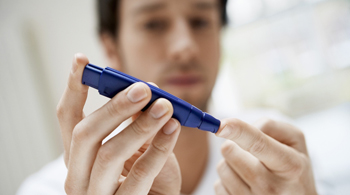Tokyo, Nov 13: Scientists from Japan have developed a wearable medical device that can help diabetic elderly or overweight people to lose fat and treat type 2 diabetes. The device developed by Kumamoto University affects visceral fat loss and improves blood glucose (sugar) by helping overweight or elderly people exercise, which is effective for the treatment of diabetes. Type 2 diabetes is a disease of systemic organ failure due to chronic hyperglycemia and inflammation from the accumulation of excess visceral fat.
 Metabolic disorders such as hyperglycemia attenuate stress resistance in the human body and exacerbate insulin resistance. The heat shock response (HSR) is activated as a response to stress in the human body, but its function decreased in those with type 2 diabetes.
Metabolic disorders such as hyperglycemia attenuate stress resistance in the human body and exacerbate insulin resistance. The heat shock response (HSR) is activated as a response to stress in the human body, but its function decreased in those with type 2 diabetes.
A research team from the university has found that by restoring the function of HSP72 — the main protein of HSR — improved glucose-related abnormalities. The researchers developed a belt-type medical device that uses a special type of rubber.
“This device is very easy to use since it simply attaches to the abdomen and it has a low-impact on the patient. One can expect the effects to be similar to exercise therapy,” Tatsuya Kondo, who led the research, said in a statement.
The team then performed a clinical trial of MES + HS on 40 obese men suffering from type 2 diabetes. Results showed a decrease fasting glucose levels, a loss of visceral fat, improve insulin resistance and a significant improvement in glycated hemoglobin (HbA1c) values.
“Even in patients who have difficulty exercising, such as those who are overweight, elderly, or have some form of disability, this device can be expected to provide acceptable treatment in addition to conventional diabetic medical care,” Tatsuya added.
The research appeared in journal Scientific Reports.







Comments
Add new comment